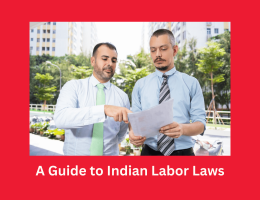
Six Fundamental Rights Every Worker Should Be Aware Of
- By admin --
- Thursday, 04 Apr, 2024
In India, the first labor laws were enacted in 1894. The purpose of these regulations was to shield manufacturing owners against strikes and unions.Additionally, they limited employees' ability to organize unions and engage in collective bargaining. India passed its first set of contemporary labor laws in 1949. These legislation allowed unionization, set minimum salaries, and offered benefits like maternity and sick leave. They also mandated that companies offer their staff training courses. India's labor laws have undergone multiple amendments throughout the years to accommodate the evolving needs of the labor force. India now has a complete legal framework protecting businesses and employees in the labor market.
The Right to Quit
In India, every worker is free to leave their position at any moment. This is a legally protected privilege, and companies are required to give workers a fair amount of notice before making them leave.In order to safeguard yourself from any harm, it's critical to understand your rights in India when it comes to leaving your employment. You may reach Vakilsearch right now for further information.
The Right to Speak Up
If workers believe their rights are being violated, they have the right to speak up. This covers the rights to safety safeguards, minimum pay and benefits, and unionization. Workers are also entitled to be free from harassment and discrimination. An employee has the right to report harassment or discrimination to the relevant authorities if they believe they have been the victim of either of these acts.
The Right to Undergo Medical Treatment
In the event of an injury sustained on the work, every employee in India is entitled to medical attention.Employees who sustain injuries that they cause themselves are also entitled to benefits; these injuries are categorized as personal injuries. An employee has the legal right to seek medical attention for any injuries sustained while doing job-related duties in India.This covers both injuries sustained during actual work hours and during training sessions. The employee just needs to demonstrate that the accident happened while they were working; they are not need to provide evidence that the employer caused the damage. The employer is required to provide proper medical care if an employee needs medical attention due to an injury they incurred at work. Employees may file a lawsuit for damages against their employers if they are not given proper medical care.
The Right to Be Paid for Hours Worked
In India, all workers are entitled to compensation for the hours they put in. In addition, workers are entitled to benefits including health insurance and a minimum wage. Employees have the right to form a union and demand benefits from their employers if they are not offered by them.
The Right to Be Protected From Discrimination at Workplace, Harassment and Hostile Environment
In India, every worker has the right to be shielded from prejudice at work. This is having the freedom to work in a setting free from intimidation and hostility. The Right to Freedom of Association and Collective Bargaining Every worker is entitled to collective bargaining and association freedom. This implies that workers have the freedom to form unions and engage in collective bargaining with their employers. If workers feel their rights are being abused, they are entitled to go on strike.Providing adjusted work schedules, tools, or facilities falls under this category. Every Indian citizen is entitled to life, liberty, and property, according to the Indian Constitution. This covers the rights to safe working conditions and a livable salary.
The Right to Have Maternity Benefits
The Maternity Benefit Act of 1961 is relevant to all women employed by mines, factories, plantations, or any other establishment with ten or more workers. Examine the following sections to learn about the requirements for eligibility and the advantages of maternity leave in India.
Prerequisite for Proof of Work
A woman had to have worked for her company for at least 80 days in the 12 months preceding the anticipated delivery date in order to be eligible for benefits under the Maternity Benefit Act of 1961. She can take advantage of the required maternity leave as well as any extra time off or benefits offered by her employer if she satisfies this condition.
Eligibility of Motherhood in India
In India, all women who are expecting, adopting, miscarrying, acting as surrogate mothers, or commissioning mothers are eligible for maternity leave. The leave period lasts for up to 26 weeks after the day the newborn is given to the adoptive parents, even in surrogacy situations.
Conclusion
It's critical that you know your fundamental rights as an employee and what is expected of you to uphold those rights. Knowing your rights as an employee can help you make sure you're doing everything you can to safeguard yourself and hold your employer responsible. Get in touch with Vakilsearch right now for additional details.





